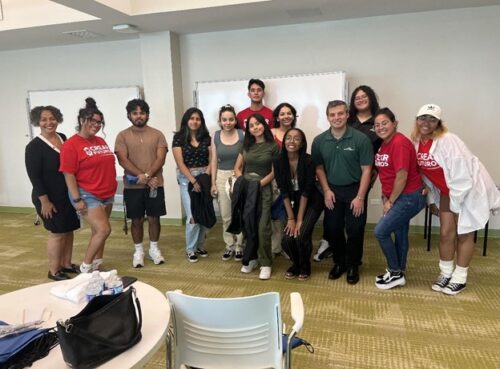
When all Americans are treated as equal, no matter who they are or whom they love, we are all freer,” –Barack Obama.
Every day, SUNY LGBTQIA+ students experience harassment and prejudice, either directly or indirectly. Therefore, all Suny Colleges need to take action to help LGTBQIA+ students feel safe on campus in a diverse and inclusive environment to live, learn, and succeed by implementing specific anti-bullying laws, giving school personnel specific education and training, and creating inclusive and appropriate programs and spaces that allow the LGTBQIA+ students to be able to express themselves and reach their full potential.
According to the National Library of Medicine, “Outside the home, schools are the primary vehicles for educating, socializing, and providing services to young people in the United States. Schools can be difficult environments for students, regardless of their sexual orientation or gender identity, but they are often especially unwelcoming for lesbian, gay, bisexual, and transgender (LGBT) youth. A lack of policies and practices that affirm and support LGBT youth—and a failure to implement protections that do exist—means that LGBT students nationwide continue to face bullying, exclusion, and discrimination in school, putting them at physical and psychological risk and limiting their education.”
Specific anti-bullying laws in favor of the LGTBQIA+ students are needed.
One of the goals of “every educator, parent, and student is to prevent bullying from happening. Anti-bullying laws are one prevention strategy that can change social norms. When researchers in the United States began studying bullying in the early 1990s, there were only a few anti-bullying laws and policies. Now, every state and most U.S. commonwealths and territories have a law or policy on bullying,” according to a research summary from stopbullying.gov.
Anti-bullying laws should exist to protect LGBTQIA+ students from harassment based on their sexual orientation and gender identity by other students, teachers, and members of the school staff.
According to a SUNY publication by Brianna Bates, Legal Intern, Student Conduct Institute:
“Institutions should examine their nondiscrimination policies to make sure that sexual orientation and gender identity are expressly included in relevant policies.
“Although guidance about the rights of transgender athletes under Title IX continues to develop, recent OCR guidance on student athletes, court decisions, and the fact that the NCAA is reviewing a relevant policy signal that we are likely to see more activity related to the rights of transgender students in collegiate athletics.
“Federal action in this space, however, is likely to lead to further conflicts with state laws. This year alone in the U.S. there have been more than 110 anti-trans bills proposed in over 37 states, and 13 anti-trans bills passed. We can anticipate legal challenges at the intersection of Title VII, Title IX, and these state laws.
“Administrators will need to be engaged to ensure that all students are protected, and that relevant policies and procedures are updated to reflect fair treatment for LGBTQIA+ students and employees’ institution-wide.”
To foster a more diverse, secure, and inclusive learning environment on campus, specific policies should be created to help, protect, and reflect fair treatment for LGBTQIA+ students in college to create space for growth and success.
Specific education and training given to SUNY College’s personnel to support LGBTQIA+ is necessary to be implemented.
According to the Gay, Lesbian, and Straight Education Network (GLSEN), “Most school personnel desire to support students but may not understand the needs of LGBTQ students. For this reason, training for all school personnel to increase knowledge about supporting LGBTQ students is essential.”
The training of college personnel is essential, and those individuals make the difference in college settings. Research by the National Library of Medicine noted, “Training demonstrably benefits school personnel. Pre-service and in-service professional development for school personnel on subjects of LGBTQ identities can build empathy, awareness, and self-efficacy, developing actionable supportive behaviors for LGBTQ students. For example, professional development that incorporates exposure to LGBT people raises awareness of homophobic bullying and builds teachers’ skills to intervene in homophobic behaviors.”
Therefore, SUNY colleges should implement training sections as a mandatory procedure for school personnel as part of their role to really understand and protect LGBTQIA+ students on campus.
School personnel should be able to always protect and provide the necessary support to LGBTQIA+ students to guarantee them a full student experience and a better quality of education.
Are inclusive and appropriate programs and spaces in existence at SUNY colleges for LGBTQIA+ students?
The history of the LGBTQIA+ community should be taught in college, and related LGBTQIA+ material should be accessible in the school library.
According to a survey from the National Library of Medicine, “LGBTQ students found that when students know how and where to access appropriate and accurate information regarding LGBTQ people at school, they feel that their schools are safer for themselves and other LGBTQ students.” “Further, students who say that they have learned about LGBT issues at school report less bullying, more safety, less absenteeism, and less homophobic language and negative remarks based on gender expression in their schools.”
Gender-neutral bathrooms should be part of all buildings in every SUNY college. The bathrooms should be located next to any other bathrooms for male and female students to make them visible. Those bathrooms should have the appropriate labeling for students who don’t identify themselves as male or female.
An LGBTQIA+ center should be open at school to offer access to different resources and directly address specific needs that LGBTQIA+ students may have, including counseling and psychological needs that should be different from those offered to the rest of the students.
The school should hire more people from the LGBTQIA+ community to work in different areas on campus to create a sense of inclusivity and diversity, which may help LGBTQIA+ students feel more comfortable, related, and safe when attending college.
Discrimination and harassment are common among SUNY students who identify as a member of the LGBTQIA+ community. Therefore, all SUNY colleges must act to implement specific anti-bullying laws, give college personnel specialized education and training to assist and protect LGBTQIA+ students, and develop inclusive and suitable programs and spaces to allow LGBTQIIA+ students to express themselves and reach their full potential.







